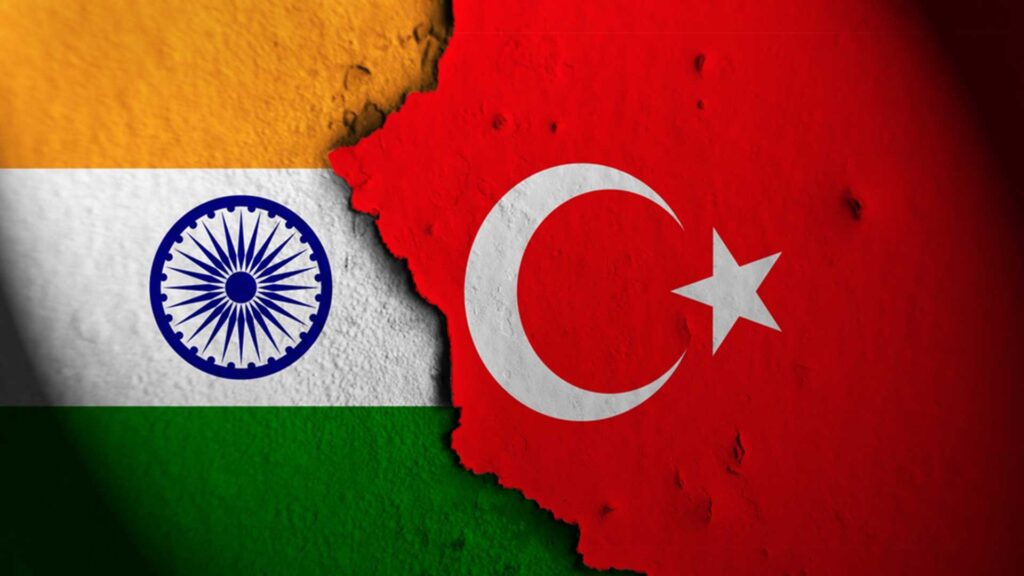Indian Universities Suspend MoUs with Turkish Institutions 2025 – What It Means
Introduction
In a striking development that blends education with international diplomacy, Indian universities suspend MoUs with Turkish institutions 2025 — a move driven by national security concerns and geopolitical tensions. Prestigious institutions like JNU, Jamia Millia Islamia, and Hyderabad’s Maulana Azad National Urdu University (MANUU) have formally discontinued their academic collaborations with Turkish universities following official advisories.
This development is not just an administrative change; it reflects how deeply international relations now influence India’s academic landscape. Let’s delve into the nuances of this decision and understand how education, politics, and diplomacy intersect in 2025.
Why Are Indian Universities Ending MoUs with Turkey?
The decision for Indian universities to suspend MoUs with Turkish institutions in 2025 stems from concerns related to Turkey’s continued support to Pakistan on sensitive issues like Kashmir. According to officials from the Ministry of Education and the University Grants Commission (UGC), these partnerships were under review for some time.
Reasons Behind the Move:
- Persistent pro-Pakistan stance by Turkish government
- Security alerts from Indian intelligence agencies
- Increasing politicization of educational exchanges
- Diplomatic fallout from events like Operation Sindoor
This action has come after high-level discussions at the Ministry of External Affairs (MEA), signaling that India is reconsidering its educational diplomacy strategy.
Which Universities Are Affected?
Several premier educational institutions have stepped back from their collaborative agreements with Turkey. These include:
- Jawaharlal Nehru University (JNU): Terminated ongoing programs and faculty exchange initiatives.
- Jamia Millia Islamia: Ceased academic partnerships with multiple Turkish research bodies.
- Maulana Azad National Urdu University (MANUU): Ended Turkish language programs citing “national security threats.”
These suspensions directly impact existing student and faculty exchange programs, collaborative research, and language learning initiatives, specifically the MANUU ends Turkish language program over national security concerns.

Impact of Turkey’s Support to Pakistan on Indian Academic Collaborations
The diplomatic strains are now reshaping the academic environment in India. The impact of Turkey’s support to Pakistan on Indian academic collaborations is far-reaching.
Direct Impacts:
- Cessation of ongoing joint research
- Cancellation of Turkish language training
- Suspension of student exchange programs
Indirect Impacts:
- Reduced cultural understanding
- Increased scrutiny on future international collaborations
- A stronger alignment with strategic allies like the U.S., France, and Japan in education
According to experts, these moves will not only affect diplomatic soft power but also global educational rankings and student mobility.
Broader Implications: The Nationalism Lens in Education
This event marks a pivotal moment where national interests are clearly prioritized over academic globalization. As Jamia Millia Islamia suspends ties with Turkish universities 2025, it’s evident that education is no longer immune to geopolitical currents.
Key Observations:
- Academia is no longer apolitical.
- Universities are expected to align with national foreign policy.
- Security is paramount even in soft sectors like education.
India’s assertiveness is a part of a broader strategic shift in the Indo-Pacific and Middle East region.
Future Outlook of Indo-Turkish Academic Relations
While current events suggest a frost in relations, the long-term scenario is still open. The Indian universities suspend MoUs with Turkish institutions 2025 movement may act as a reset rather than a complete disconnect.
Possible Future Scenarios:
- Diplomatic Re-engagement: If Turkey alters its foreign policy tone, India may resume academic ties.
- Diversification: India may strengthen academic relations with other neutral or friendly nations.
- Policy Framework: New guidelines for foreign MoUs focusing on strategic alignment are expected.
What Students and Educators Need to Know
This sudden disruption poses a question for students pursuing or planning to engage with Turkish universities.
Students should:
- Reassess their international study plans.
- Look into other partner countries offering similar programs.
- Keep updated through official university notifications.
Educators should:
- Suspend active collaboration discussions.
- Redirect focus toward Indo-centric or strategic bilateral collaborations.
- Be cautious about promoting politically sensitive programs.
Alternatives and Resources for Students
Despite these developments, students can access high-quality Indian educational resources online. Here are some alternatives:
- 📝 NCERT Courses
- 📘 Current Affairs Updates
- 📚 Subject Notes
- ❓ MCQ Practice
- 🎥 Educational Videos
- 📄 Free Syllabus Guides
- 📥 Download NCERT PDFs
- 🧠 NCERT Mind Maps
Need a website for your school to distribute content like this? Check out Mart India Infotech — expert solutions for academic institutions.
Expert Opinions and Analysis
Academic experts argue that this is not just about politics. It’s a test case of how Operation Sindoor’s effect on India-Turkey educational relations may redefine the boundary between diplomacy and education.
Dr. Aparna Mukherjee, an international affairs professor, remarks:
“Academic MoUs are not mere paperwork—they’re strategic assets. India sending a strong message shows how higher education is part of national power.”
Statistics You Should Know
- Over 45 Indian universities had signed MoUs with Turkish institutions between 2010–2022.
- 17 Turkish institutions were actively collaborating in student exchanges till 2024.
- Approximately 1,200 Indian students were part of programs in Turkey as of last academic year.
- After advisory, 72% of these partnerships are now on hold or terminated.
FAQs
- Why did Indian universities suspend MoUs with Turkish institutions in 2025?
Indian universities suspended MoUs in response to Turkey’s support for Pakistan and national security concerns. - Which universities have terminated ties with Turkey?
JNU, Jamia Millia Islamia, and MANUU are among the top institutions that have ended MoUs with Turkish universities. - Is MANUU still offering Turkish language programs?
No, MANUU has officially ended Turkish language programs due to national interest and security concerns. - What is the impact of Turkey’s support to Pakistan on Indian academic relations?
It has led to the cancellation of collaborative projects, student exchanges, and academic programs. - Will students currently studying under these MoUs be affected?
Yes, many students may face disruptions, though universities are expected to provide alternative options. - What is Operation Sindoor’s effect on India-Turkey educational relations?
Operation Sindoor has heightened sensitivity, leading to stricter educational diplomacy from India. - Can the ties between Indian and Turkish universities be restored?
Yes, if Turkey realigns its geopolitical stance, academic cooperation may resume in future. - Are there alternative countries for academic MoUs?
India is expanding partnerships with the U.S., Japan, France, and Australia for academic cooperation. - What resources are available for Indian students affected by this move?
Students can access NCERT courses, notes, videos, and free downloads from platforms like Edunovations. - Is this the first time India has acted against foreign academic collaborations due to politics?
No, but this is among the most publicized and diplomatically significant actions involving education.
Conclusion
The decision that Indian universities suspend MoUs with Turkish institutions 2025 marks a critical intersection of diplomacy, academia, and national interest. While the immediate implications are substantial, it also opens doors to stronger and more secure international collaborations. Universities must now tread carefully, balancing academic freedom with national responsibility.









